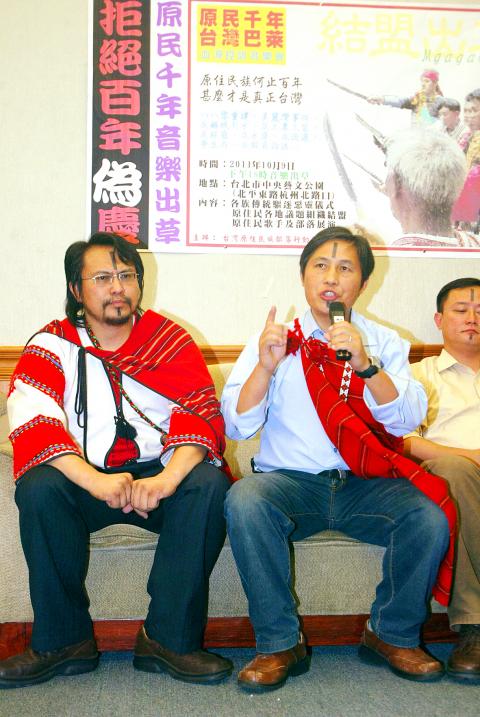Aboriginal rights advocates yesterday announced a symbolic mgaya — the Atayal word for a “headhunt”— against the Republic of China (ROC) government on Sunday, the eve of the ROC’s centennial celebrations.
After performing a traditional song and dance, Sediq National Assembly spokesman Watan Diro, in a traditional Sediq outfit, took out a knife and cut in half a sign with the number “100” and the phrase “A Spectacular Century; Republic of China” — which is the official slogan for the ROC’s centennial celebrations.
It was a gesture of discontent toward the ROC government, Wantan said, as the ROC government, like the Japanese colonial government that preceded it, is a repressive foreign regime to Taiwan’s Aborigines who have been living on the island for thousands of years.

Photo: CNA
“We, Taiwan’s Aboriginal peoples, refuse to join the celebrations for the illegitimate ROC regime’s 100th anniversary,” said Indigenous Peoples’ Action Coalition Taiwan secretary-general Omi Wilang, an Atayal Aboriginal. “We have nothing to celebrate, as the Aborigines have only suffered under the ROC government.”
For instance, Omi said, the ROC government has always — and still tries to — store nuclear waste in traditional Aboriginal domains; a nuclear waste dump is operating on Orchid Island (蘭嶼), where more than 90 percent of the residents are Aboriginal Tao, and a new nuclear waste storage facility is planned for construction in Daren Township (達仁), Taitung County, a traditional domain of the Paiwan.
Echoing Omi, Taiwan Indigenous Peoples’ Policies Association president Oto Micyang, an Amis Aborigine, said land disputes between the central government and Aborigines that have recently surfaced are also evidence of injustices the ROC has forced upon the Aborigines.
“The Japanese took our lands by force and at the end of World War II, many tribal elders were expecting to finally get their lands back,” Oto said. “Instead of returning the lands to Aborigines, the ROC government simply took over the land for itself.”
“I don’t know how we should join the ROC celebrations and how we can teach our children to respect the ROC,” said Daya Dakasi (官大偉), an assistant professor at National Chengchi University’s Department of Ethnology, an Atayal. “The ROC has taken natural resources that belong to Aborigines, occupies our lands and collaborates with capitalists and big corporations to plan large-scale development projects without consulting our peoples.”
Daya added that despite the Aboriginal Basic Act (原住民族基本法), which grants Aborigines autonomy, land, culture and natural resource rights, “the ROC government has failed to pass relevant laws and the promises to protect our rights are still unfulfilled.”
Representatives from all Aboriginal communities will gather at the Central Arts Park in Taipei City at 4pm on Sunday to perform the mgaya ceremony, which will be followed by music and cultural performances that begin at 6pm.

US climber Alex Honnold is to attempt to scale Taipei 101 without a rope and harness in a live Netflix special on Jan. 24, the streaming platform announced on Wednesday. Accounting for the time difference, the two-hour broadcast of Honnold’s climb, called Skyscraper Live, is to air on Jan. 23 in the US, Netflix said in a statement. Honnold, 40, was the first person ever to free solo climb the 900m El Capitan rock formation in Yosemite National Park — a feat that was recorded and later made into the 2018 documentary film Free Solo. Netflix previewed Skyscraper Live in October, after videos

NUMBERS IMBALANCE: More than 4 million Taiwanese have visited China this year, while only about half a million Chinese have visited here Beijing has yet to respond to Taiwan’s requests for negotiation over matters related to the recovery of cross-strait tourism, the Tourism Administration said yesterday. Taiwan’s tourism authority issued the statement after Chinese-language daily the China Times reported yesterday that the government’s policy of banning group tours to China does not stop Taiwanese from visiting the country. As of October, more than 4.2 million had traveled to China this year, exceeding last year. Beijing estimated the number of Taiwanese tourists in China could reach 4.5 million this year. By contrast, only 500,000 Chinese tourists are expected in Taiwan, the report said. The report

Temperatures are forecast to drop steadily as a continental cold air mass moves across Taiwan, with some areas also likely to see heavy rainfall, the Central Weather Administration (CWA) said. From today through early tomorrow, a cold air mass would keep temperatures low across central and northern Taiwan, and the eastern half of Taiwan proper, with isolated brief showers forecast along Keelung’s north coast, Taipei and New Taipei City’s mountainous areas and eastern Taiwan, it said. Lows of 11°C to 15°C are forecast in central and northern Taiwan, Yilan County, and the outlying Kinmen and Lienchiang (Matsu) counties, and 14°C to 17°C

STEERING FAILURE: The first boat of its class is experiencing teething issues as it readies for acceptance by the navy, according to a recent story about rudder failure The Hai Kun (海鯤), the nation’s first locally built submarine, allegedly suffered a total failure of stern hydraulic systems during the second round of sea acceptance trials on June 26, and sailors were forced to manually operate the X-rudder to turn the submarine and return to port, news Web site Mirror Daily reported yesterday. The report said that tugboats following the Hai Kun assisted the submarine in avoiding collisions with other ships due to the X-rudder malfunctioning. At the time of the report, the submarine had completed its trials and was scheduled to begin diving and surfacing tests in shallow areas. The X-rudder,